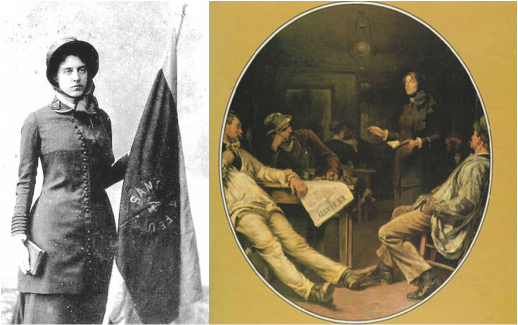One winter’s night in Paris in the 1880s, Catherine (Katie) Booth-Clibborn (18 September 1858 – 9 May 1955) and her two young co-workers, Blanche Young and Kate Patrick (an Irish lass), went out with shawls on their heads, and made their way to one of the boulevard cafés. Katie passed the door, and passed it again. She turned to her two friends and said, “You have never known [me] till now; you see what a coward [I am]”. “No, no, no!” protested both her companions.
THIS said by the very same young woman who was now a woman of great renown in the press and to the public, because she had been freed from prison by the strength of the defence which she herself presented to the judge. Her time in prison was in Switzerland and the charge against her was for preaching the Gospel in a public gathering. She had endured a testing time separated from friends and family, but had endured and had a great victory indeed. Yet now, this brave and battle scarred heroine was admitting to her fear.
At last she put her hand to the door of the café, pushed it open, and went in. A man in a white apron was selling drink. Going up to him she said, “May I sing something?” The man stared open-mouthed. Trembling from head to foot, she repeated, “I should like to sing something.” “Very well!” replied the man, and she began:
Les Anges y font leur sejour; (The Angels will make their stay)
Le soldat qui lutte et qui prie. (The soldier who struggle and prays)
Y sera bientot a son tour (will soon be there)”
That night they visited 16 cafés and when she got home she felt as if she had never been happier in her life; never nearer to Jesus. She had tried in her own way to obey His command, “Let your light shine before men.” From that time, thousands and thousands of cafés were visited and much good was thus done.
—Excerpt from The Marechale by Strahan

 RSS Feed
RSS Feed